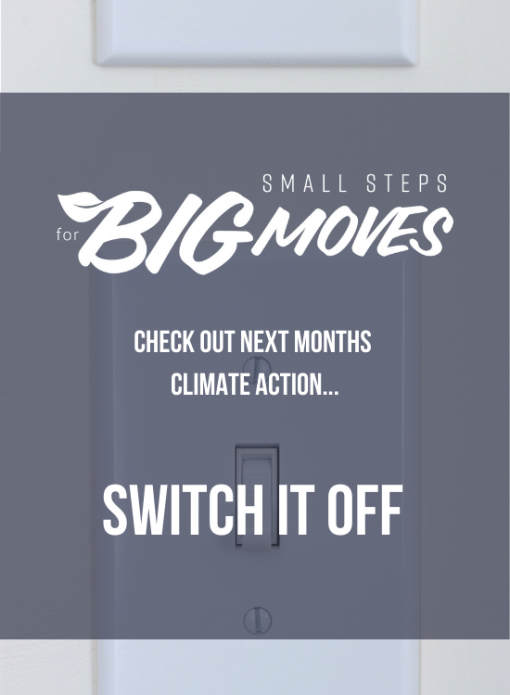
Whistler is Making BIG MOVES for our Climate. When we act together, small steps become BIG MOVES
Whistler’s Climate Action BIG MOVES Strategy identifies the six most impactful action areas we need to focus on as a community to reduce emissions and make Whistler a more climate resilient community. We all have a role to play! The RMOW, in partnership with Whistler’s environmental charity AWARE, has created Small Steps for BIG MOVES: 12 months of climate actions we can each take to support Whistler’s six BIG MOVES.
TAKE ACTION! This February, let’s:
Turn down the heat
Being smart about managing our heat at home and at work moves the dial on Big Move #5: Make existing buildings better.
Whistler’s community energy consumption for 2019 totalled 3.5 M GJ, which represented a 3 per cent increase compared to 2018.
Electricity is the most prevalent type of energy consumed in Whistler at 39 per cent of the total consumption, followed by vehicle fuels (31 per cent), and natural gas (27 per cent). In 2019, buildings accounted for 39 per cent of Whistler’s greenhouse gas emissions, mainly related to energy use for space and water heating. The increased use of natural gas in recent years is moving Whistler in the wrong direction on our climate goals as natural gas is 16 times more emissions intensive than electricity in BC.
In the midst of the winter months we all want to keep cozy but turning that thermostat up just one degree adds between one to three per cent to your heating bill. No matter our living arrangement, managing our heating habits and electricity consumption saves money and reduces Whistler’s climate footprint.

Ready to take action? Let’s try one (or some) of these Small Steps for BIG MOVES:
1. EMBRACE WINTER. WRAP UP AND TURN DOWN THE HEAT.
Whether it’s wrapping up in an extra layer to get cozy or turning down the heat, there are lots of ways to
- Embrace the cool and chill. This is the season for warm sweaters, wooly socks, slippers, blankets and hot drinks.
- Programmable thermostats allow you to program heat needs to your daily rhythms. Drop the heat levels at night and while you are at work to save emissions and money.
2. GET A HOME ENERGY ASSESSMENT WITH A REBATE FROM THE RMOW.
Whistler homeowners can access a $250 rebate towards an Energuide for Homes. The average value of a home energy evaluation is $350 to $600 (depending on the size and complexity of the home) and will let you know what updates to your home could save you money.
Check out:
- Details of the Residential Energy Rebate Program
3. TAKE SIMPLE STEPS TO DRAFT-PROOF YOUR HOME.
Explore options to add insulation, draft excluders, and even seasonal insulators to help keep heat in. This may not be possible for everyone but can make a big difference if it works for you.
Find out how with:
4. LEARN ABOUT CLEANBC BETTER HOMES AND HOME RENOVATION REBATE PROGRAM.
If you’re building or renovating (or just thinking about it), check out CleanBC Better Homes and Home Reno Rebates.
Details available here:
5. CONSIDER REDUCING HEATING COSTS WITH HEAT PUMP TECHNOLOGY.
An air-source heat pump is energy-efficient, environmentally friendly and an alternative to electric furnaces and baseboards, natural gas or oil heating systems. Heat pumps can be up to 300 per cent more efficient than electric baseboards and up to 50 per cent more energy efficient for cooling compared to a typical window AC unit.
Considering a heat pump:
- Review info and tips from BC Hydro
- Explore Resort Municipality of Whistler Heat Pump Rebate Top Ups
An air-source heat pump is energy-efficient, environmentally friendly and an alternative to electric furnaces and baseboards, natural gas or oil heating systems. Heat pumps can be up to 300 per cent more efficient than electric baseboards and up to 50 per cent more energy efficient for cooling compared to a typical window AC unit.
Considering a heat pump:
- Review info and tips from BC Hydro
- Explore Resort Municipality of Whistler Heat Pump Rebate Top Ups
What We Heard ~ Stories Shared
Thank you for sharing your stories!
Check out these small steps for BIG MOVES that some of our community members have taken:
- Melissa’s family takes advantage of the passive solar heat during sunny winter days, which helps them keep their thermostat turned down. Plenty of blankets keep them cozy in the evenings!
- Lauren finds it easy to add a layer of clothing and turn down the heat. This helps her realize cost savings while enjoying that cozy sweater-weather feeling.
We invite you to share your stories about your small steps for BIG MOVES every month. There’s a chance to win some great prizes if you submit a story! Have a look at our December theme: whistler.ca/SwitchItOff.
Check Out These Electrifying Quick Facts:
Heating your home efficiently in the winter months can be easily achieved by running baseboard heaters efficiently, managing your thermostat, draft proofing and more.
Commercial buildings represent 26 per cent of these emissions and residential buildings account for 12 per cent.
Canadians are the fourth highest energy consumers in the world. Our per capita consumption is five times the world average and 29 per cent higher than the US.
Draughts also get in around doors, windows and through gaps in floorboards and skirting boards, allowing both warm and cool air to escape.
Conserving heat and saving money go hand in hand. Little adjustments over time add up to big savings for our planet and your pocket.



